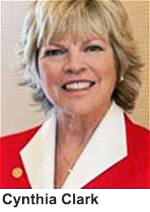We teach children to say it but sometimes forget to say it ourselves. (Republished from 2017.)

Whether nurses are caring for patients, working with colleagues, or living their personal lives, taking time to say thank you as an expression of gratitude is a fundamental that promotes civility, positive relationships, improved morale, and organizational commitment.
 Vince Lombardi, the legendary coach of the Green Bay Packers, a professional American football team, was a staunch supporter of the game’s fundamentals. He believed that, to be a winning team, the players needed to be steeped in the basics—tackling, blocking, controlling the ball, and forcing turnovers. Coach Lombardi is reputed to begin each season by gathering the players, holding up a football (the American version), and declaring, “Gentlemen, this is a football.” While this declaration may have perplexed the players—maybe even annoyed some of the veterans—Lombardi was stressing an important point: Understanding and successfully executing the game’s fundamentals are prerequisites to becoming a winning team.
Vince Lombardi, the legendary coach of the Green Bay Packers, a professional American football team, was a staunch supporter of the game’s fundamentals. He believed that, to be a winning team, the players needed to be steeped in the basics—tackling, blocking, controlling the ball, and forcing turnovers. Coach Lombardi is reputed to begin each season by gathering the players, holding up a football (the American version), and declaring, “Gentlemen, this is a football.” While this declaration may have perplexed the players—maybe even annoyed some of the veterans—Lombardi was stressing an important point: Understanding and successfully executing the game’s fundamentals are prerequisites to becoming a winning team.
Just as playing winning football is all about excelling at the fundamentals, so it is with civility and cultivating enduring relationships. One of civility’s fundamentals is expressing gratitude in the form of a genuine, simple thank you.
Taking time to say thank you builds trust, respect, and goodwill in our personal lives as well as in our professional work environments. Showing appreciation, saying thank you, and recognizing others for their contributions are cost-free, powerful tools that motivate and inspire teamwork. When we show appreciation, respect, and gratitude to those around us, we become recipients of positive energy. And when we fail to recognize, appreciate, and acknowledge others, the impact can be damaging and the negative ripple effect far-reaching.
‘A simple thank you would have gone a long way’
A housekeeper—I’ll call her Alice—cleans homes and businesses for a living. She has been cleaning a church in her community for nearly a decade. She is very good at her job, dedicated to excellence, and proud of her cleaning abilities. The work is demanding and physical; she works hard to make a living. Although she’d like to make more money, she knows service workers are unlikely to earn high wages. Yet, like all of us, she wants her work to be appreciated and acknowledged.
Unfortunately, after cleaning the church for nearly 10 years, Alice has never received a pay increase or one word of gratitude—not even a simple thank you. As Alice recounted her experience, she said she was no longer going to clean the church and had recently turned in her resignation. She observed: “I just can’t keep doing this work. A raise would have been nice, but a simple thank you would have gone a long way to keep me there for years to come. But, instead, I need to leave—it’s a matter of dignity and self-respect. I need to put my energy in places where people appreciate me.”
Ordinary, but important
A sincere expression of gratitude is a simple courtesy that takes just a moment, costs nothing, and can reap infinite rewards for both the receiver and giver of a kind word. Thank you is a welcome phrase that is often under-used. Think about it: How often do we say thank you to people who touch our daily lives, often in mundane ways? In our home, I am the one who usually washes and folds the laundry. It’s a typical household task that’s not necessarily enjoyable but needs to be done. In nearly every case, my husband takes a moment to thank me for laundering his clothes and pressing his favorite shirts. Likewise, I thank him for keeping our property in tip-top shape, trimming the trees, mowing the lawn, and maintaining the greenhouse—simple, routine, and ordinary chores that make a house a home.
No matter how busy we are, it’s important for us to thank people for even the smallest gestures. In my opinion, there’s something truly magical about saying thank you. It acknowledges and shows respect to the person who has reached out, helped, or done something for us. Saying thank you indicates that you don’t take others for granted, but, instead, recognize that they matter.
So why don’t we say thank you more often? In this fast-paced, increasingly digital world, we frequently fail to show appreciation to those who share that world with us. Handwritten thank-you notes have fallen by the wayside in favor of email, instant messages, and text correspondence. Our conversations seem to become shorter with fewer common courtesies, including a simple thank you.
Sincere, specific, and authentic
Because expressing gratitude is important, we need to be sure it is sincere, specific, and authentic. Here are a few ideas for saying thank you effectively. Personalize your touch. Make eye contact, smile, and speak in a friendly manner. Be genuine, sincere, and specific. Using the example of my husband keeping the yard in great shape, I might say something like this: “Thank you for cutting and trimming the lawn today. It looks awesome. I love how you take such great care of our home.”
Kindness is a language which the deaf can hear and the blind can see.
—Mark Twain
Showing gratitude in the workplace is also important. Thank your co-workers and other team members for their contributions and achievements. It’s great to say thank you in person, but a handwritten note is also appreciated. In our hurried, rapidly changing work environments, we often miss opportunities to express appreciation, so we need to be mindful about doing it. Expressing thanks can have a profound and positive impact on relationships, productivity, and morale.
Conversely, as in the case of Alice and the ungrateful church, when our contributions go unacknowledged and unappreciated, confidence wanes and our commitment to the organization is diminished. Lack of gratitude in the workplace decreases morale, commitment, and productivity, and hard-working employees may leave the organization for greener pastures.
So take time to thank those around you today, and make a point of doing it in the months and years to come. Others benefit from your kindness, and you will reap the rewards that accompany sincere and genuine expressions of gratitude. It’s fundamental! RNL
Cynthia Clark, PhD, RN, ANEF, FAAN, strategic nursing advisor and consultant for ATI Nursing Education, founder of Civility Matters, and author of Creating & Sustaining Civility in Nursing Education, is a psychiatric nurse/therapist and an expert in fostering civility and healthy workplaces. She is also professor emeritus at Boise State University in Boise, Idaho, USA. Recognized for her pioneering work in fostering civility in the nursing community, Clark has conducted numerous studies to better understand issues related to civility and to develop best practices to foster civility and healthy workplaces.
An avid walker and hiker, she also enjoys biking, canoeing, cooking, and reading, as well as spending time with family, friends, and multiple rescue pets. Click here to access Blogger-resident entries by Clark posted before 2017.
Editor's note: This article has been reposted because of technical problems with the RNL website when the article was first published on 20 July 2017.